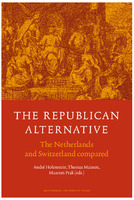The Republican Alternative
The Netherlands and Switzerland Compared
| dc.contributor.editor | Prak, Maarten | |
| dc.contributor.editor | Maissen, Thomas | |
| dc.contributor.editor | Holenstein, André | |
| dc.date.accessioned | 2010-12-31 23:55:55 | |
| dc.date.accessioned | 2019-12-10 14:46:32 | |
| dc.date.accessioned | 2020-04-01T15:37:48Z | |
| dc.date.available | 2020-04-01T15:37:48Z | |
| dc.date.issued | 2008 | |
| dc.identifier | 340047 | |
| dc.identifier | OCN: 370338448 | en_US |
| dc.identifier.uri | http://library.oapen.org/handle/20.500.12657/35282 | |
| dc.description.abstract | The Netherlands and Switzerland are among the world's most economically successful societies. Their inhabitants enjoy high standards of living and express great satisfaction with their lives according to surveys. This despite serious natural handicaps, such as a lack of raw materials and an abundance of water and rock respectively. The foundation for their prosperity was laid in the early modern period, between roughly 1500 and 1800, when, as federal republics, the two countries were already something of an anomaly in Europe. Their inhabitants experienced serious anxieties and tried to justify their exceptionality, to which they were, at the same time, greatly attached. The Republican Alternative attempts to clarify, through a sustained comparison, the special character of the two countries, which were similar perhaps at first sight, but nonetheless developed their own solutions to the challenges they faced. The book includes in-depth discussions of citizenship arrangements, Swiss and Dutch dealings with religious pluriformity, political discourses justifying the republican form of government, the advantages and disadvantages of an agrarian over a commercial society. | |
| dc.language | English | |
| dc.subject.classification | thema EDItEUR::P Mathematics and Science::PD Science: general issues | en_US |
| dc.subject.other | popular science | |
| dc.subject.other | wetenschap algemeen | |
| dc.title | The Republican Alternative | |
| dc.title.alternative | The Netherlands and Switzerland Compared | |
| dc.type | book | |
| oapen.abstract.otherlanguage | Nederland en Zwitserland behoren tot de meest succesvolle samenlevingen, in Europa en de wereld. De inwoners hebben een hoge levensstandaard en geven in enquêtes te kennen dat zij tevreden zijn met hun bestaan. Dit ondanks niet onaanzienlijke natuurlijke handicaps, zoals een overdaad aan water en stenen op hun territorium en een gebrek aan grondstoffen. De basis voor die voorspoed werd gelegd in de periode tussen ruwweg 1500 en 1800, toen beide landen als federale republieken ook al buitenbeentjes vormden in Europa. De bewoners van die twee staten hadden het daar soms moeilijk mee en putten zich uit in rechtvaardigingen van hun buitenissigheid, waaraan ze tegelijkertijd zeer gehecht waren. The Republican alternative belicht door middel van een vergelijking de eigenaardigheden van twee landen die aan elkaar verwant waren, maar toch ook in allerlei opzichten van elkaar verschilden. Het boek behandelt onder meer de inspraak van burgers in de politiek, de omgang met religieuze verscheidenheid, het discours over de Republiek, de kunstvormen die populair waren, het eigen geschiedbeeld en voor- en nadelen van een agrarische boven een commerciële samenleving. | |
| oapen.identifier.doi | 10.5117/9789089640055 | |
| oapen.relation.isPublishedBy | dd3d1a33-0ac2-4cfe-a101-355ae1bd857a | |
| oapen.relation.isbn | 9789089640055 | |
| oapen.pages | 360 | |
| oapen.identifier.ocn | 370338448 |

